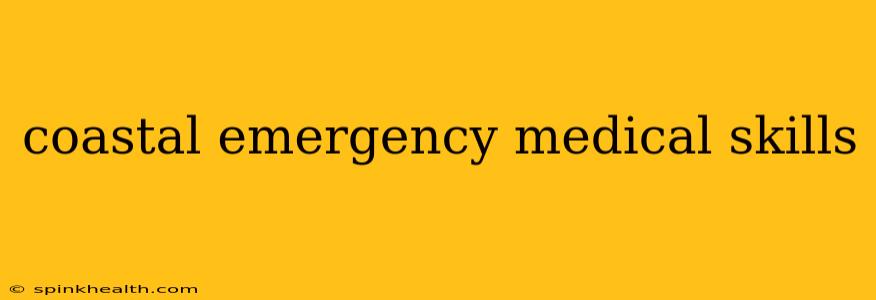The salty air, the crashing waves, the breathtaking views – the coast offers unparalleled beauty. But this idyllic setting can quickly turn treacherous, demanding specialized skills to handle coastal emergencies. This isn't your average wilderness first aid; coastal emergencies present unique challenges, from powerful currents and unpredictable tides to the harsh marine environment itself. This guide delves into the essential knowledge and techniques needed to provide effective medical care in these demanding situations.
What Makes Coastal Emergency Medical Situations Unique?
The ocean is a powerful and unforgiving force. Imagine this: a sunny afternoon fishing trip turns perilous when a sudden squall whips up monstrous waves, capsizing your boat. Or perhaps a hiker loses their footing on a cliff edge, suffering severe injuries far from help. These scenarios underscore the distinct challenges of coastal emergency medicine:
- Remote Locations: Many coastal areas are remote, making access to emergency services difficult and time-consuming. This necessitates a higher level of self-reliance and advanced first aid skills.
- Environmental Hazards: Exposure to sun, cold, and saltwater can exacerbate injuries and complicate rescue efforts. Hypothermia is a significant concern in cold water incidents, while dehydration and sunstroke are common threats in warmer climates.
- Marine Life: Encounters with jellyfish, stingrays, or sharks can result in serious injuries requiring specialized treatment.
- Water-Related Injuries: Drowning, spinal injuries from diving accidents, and trauma from boat collisions are prevalent in coastal settings.
- Unpredictable Weather: Coastal weather can change rapidly, making rescue operations even more hazardous.
What are the Most Common Coastal Emergencies?
Coastal emergencies span a wide range of scenarios, each requiring specific responses. Let's explore some of the most common:
Drowning:
This is arguably the most frequent coastal emergency. Recognizing the signs of drowning (passive drowning, struggling, etc.) and initiating immediate rescue and CPR are paramount. Knowing how to perform water rescues safely is crucial.
Marine Animal Encounters:
Stingray stings, jellyfish stings, and shark bites require prompt and appropriate first aid. Knowing how to identify the type of injury and administer appropriate treatment (vinegar for jellyfish, hot water for stingrays) can significantly impact the outcome.
Water Sports Injuries:
Surfing, diving, and boating accidents often result in traumatic injuries such as fractures, lacerations, and spinal injuries. Proper stabilization and emergency care are critical before transporting the victim.
Hypothermia:
Cold water significantly increases the risk of hypothermia, even in mild climates. Recognizing the signs and implementing appropriate rewarming techniques are life-saving.
Trauma from Falls:
Falls from cliffs or rocks are common in coastal areas. These often lead to significant injuries requiring advanced stabilization and evacuation techniques.
What First Aid Supplies are Essential for Coastal Emergencies?
Preparation is key. A comprehensive coastal emergency kit should include:
- Standard first aid supplies: bandages, antiseptic wipes, pain relievers, etc.
- Items specific to marine environments: stingray sting treatment kit, jellyfish treatment kit, sunscreen, and emergency shelter.
- Communication devices: satellite phone or personal locator beacon (PLB).
- Navigation tools: map, compass, GPS device.
How Can I Prepare for a Coastal Emergency?
Preparation is the best defense. Here's how to increase your readiness:
- Take a Wilderness First Aid/Water Rescue Course: Gain the knowledge and skills to handle various emergencies.
- Assemble a comprehensive first aid kit: Tailor your kit to the specific hazards of your chosen coastal area.
- Learn basic water safety and rescue techniques: Knowing how to perform rescues safely is essential.
- Check weather conditions before heading out: Avoid venturing into hazardous conditions.
- Inform someone of your plans: Let someone know your itinerary and expected return time.
Coastal emergency medical skills are more than just first aid; they're a combination of knowledge, preparedness, and quick thinking. By mastering these essential skills, you can increase the chances of survival and successful outcomes in challenging coastal situations. Remember, the beauty of the coast is amplified by the knowledge that you're ready to face its unpredictable nature.

